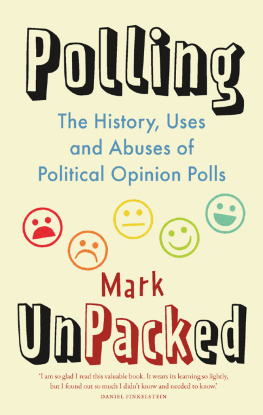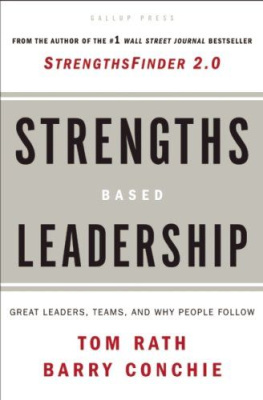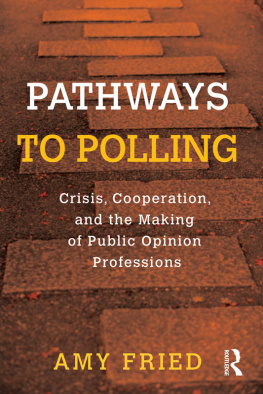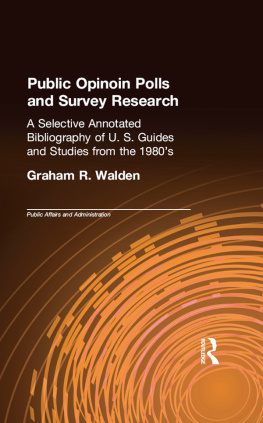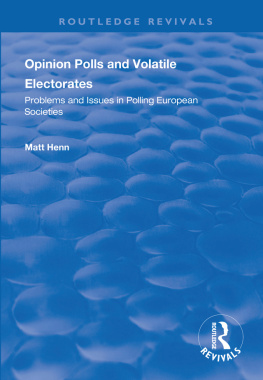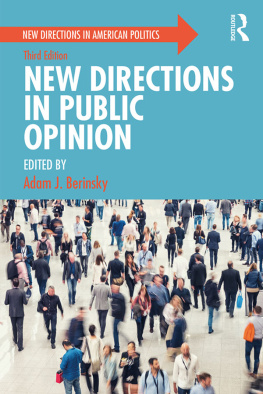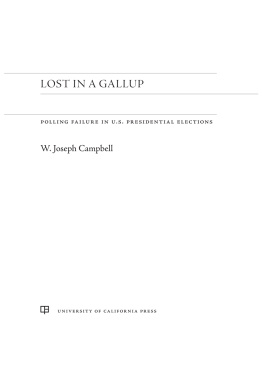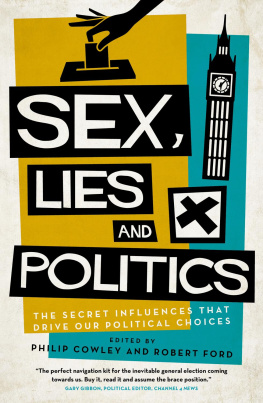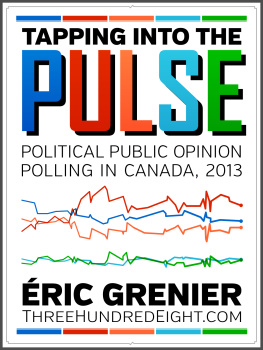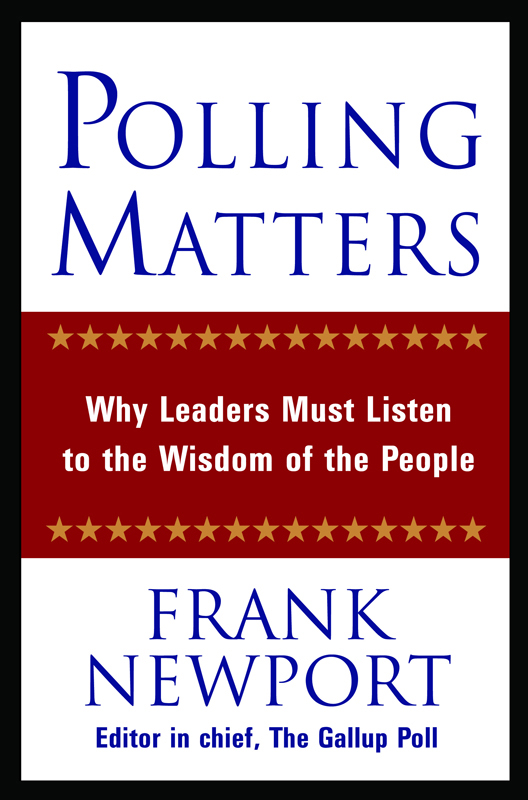Copyright 2004 by The Gallup Organization
All rights reserved.
Warner Books
Hachette Book Group
237 Park Avenue
New York, NY 10017
Visit our website at www.HachetteBookGroup.com.
The Warner Books name and logo are trademarks of Hachette Book Group, Inc.
ISBN: 978-0-7595-1176-7
First eBook Edition: July-2004
To Kim
This book is about pollswhat they are, where they come from, why they are important, and how they can and should be a more integral part of the functioning of our democratic society.
Polling is a wonderful application of scientific principles to the challenge of understanding and extracting the insights, emotions, and attitudes of the millions of people aggregated into a common society. There is great wisdom bound up in these collective views. Polling is by far our best, most efficient, and most productive way of extracting this wisdom. Rather than fearing the influence of polls or denigrating their value, we should be spending more time and devoting more energy to a focused effort to use them wisely.
We dont see a lot of movies and television shows devoted to pollsters (in fact, we sadly dont see any at all, although The West Wing has the recurring character of a pollster), but we should. Polling is complex, fascinating, and important. Pollsters give themselves the task of figuring out what millions of people are thinking about a given topic and report the results in a matter of days or even hours. These results provide pooled wisdom and insights built out of the experiences of millions of people across numerous generations.
This process isnt new. Polling has been around in one form or another for well over one hundred years. Some historians recognize the first poll as having been conducted as far back as 1824. (That poll supposedly focused on the presidential election between Andrew Jackson and John Quincy Adams.) By the end of the 1800s, straw polls were very common across the United States. Newspapers and magazines began to publish polls of one sort or anotherfocusing on electionsin ever-increasing numbers as the twentieth century dawned. Pollster David Moore has a fascinating chapter on the history of polls in his book The Superpollsters, pointing out that by the 1924 and 1928 elections, the Hearst newspaper chain was running presidential preelection polls involving almost all states of the Union. Then came 1936, which along with 1948 (although for different reasons) is perhaps pollings most famous year. In 1936, a young man named George Gallup proved the value of a scientific approach to polling when he made the daring prediction, contrary to much conventional wisdom, that President Franklin Roosevelt would win reelection. Of course, FDR did win, and George Gallup went on to be a polling hero.
Pollings influence has grown exponentially since. Most presidents from Roosevelt on have relied on polls to gain insights into the mood of the electorate. Every major news outlet in the United States today not only reports on polls but commissions them directly. Polling is also common in other countries around the world.
Polls provide routine and frequent assessment of the publics views on almost any topic one can name. Polling mea-sures public reaction to major news events, often within hours or days of their occurrence. Polling provides the publics views on important policy issues facing the country, ratings of leaders, and assessments of actions taken by elected representatives. Polling provides an appraisal of the publics mood, reaction to sports and entertainment events, and insights into the ways in which people are thinking, feeling, and living. Polls, in short, function as a form of scientific gossip, telling us not just what the neighbor across the backyard fence is thinking but what all of our neighbors across all of our fences are doing and feeling.
A friend once gave me a T-shirt that had the words Famous Polls at the top, with pictures of all sorts of different uses of that word: the pope (who is from Poland), the North Pole, a Maypole, a polar bear, polo poles, the pole vault, and so forth. Of course, none of these are the polls were talking about here. This book deals with polls that ask questions and as a result help us understand people by gathering, organizing, and summarizing their answers. In this book, Ill be using the word polling to describe any process by which the views of a group of people are systematically tabulated and released back to the public.
But theres more to it than that. The polls on which Ill be focusing use the results of interviews with relatively small numbers of people to estimate what would have been found if it had been possible to interview every person in enormously large groups. Pollsters, in other words, arent interested only in the opinions of the people actually interviewed. Were interested in using these sample data to estimate the opinions of much, much larger numbers of people.
The results of polls reflect the combined experience and backgrounds of the amazingly disparate group of citizens that makes up our nations population. Americans in a randomly selected poll sample come from all areas and walks of life, are of both genders and all ages and ethnicities, and from all levels of socioeconomic status. By the luck of the draw, a poll might contain a billionaire, a janitor, a chemistry professor, a seventy-year-old with a lifetimes experience as a plumber, a PTA homeroom mother, or a single mother working two jobs in an attempt to get by. Americans in such a random sample vary widely in terms of their background and experiences, having seen live plays, having flown on an airplane, having been in a big city, having milked a cow, having worked with their hands for a living, having been in court, having had a major medical operation, and having served in the military.
And, of course, polls include respondents who have widely varying combinations of education, knowledge, and intelligence. Its impossible to know exactly what types of knowledge are most valuable at any point in the nations history, or in any specific situation. But the blend of the experience and background that is accessed by polling provides an extraordinarily valuable resource to use in directing and guiding the societys progress. The purpose of this book is to examine this tremendous resource and how we can make better use of it.
Not everyone agrees that polling is valuable. Indeed, the history of polling is also the history of antipolling sentiment. Dr. George Gallup, who founded the Gallup Organization in 1935, ran into disbelief about the polling process almost from the first day he released public polls in the 1930s. He spent a good deal of time attempting to explain his processes in articles, books, and speechesas have many other survey researchers and pollsters in the years since.
Gallup put it best a few years after his polls started to become famous when he said, We are now witnessing a paradoxical but unavoidable phenomenonthe polls of public opinion are themselves becoming an issue of public opinion. There are those who see more vice than virtue in this new instrument.
Variants of these views are still with us. We receive messages every day from good Americans across the country who are asking, in the immortal words of one such correspondent, Just what the hell are polls?
Here is a sample of what we heard around the beginning of the 2003 war in Iraq, when polls were showing that 70 percent of Americans supported President George W. Bushs determination to go to war with that country:
Dear Gallup PollI have never been polled by you, and I have only known one person in my entire life of 52 years who has ever been polled by you. Therefore I am deeply skeptical of your recent polling of American opinion on the war in Iraq. If you polled me, and all my friends and relatives, you might see that there is much less support for this war than you think. Thank you.



